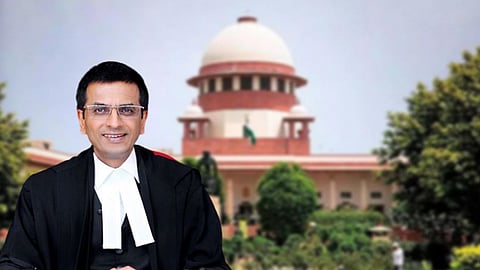

New Delhi | As an institution, our shoulders are "broad enough", the Supreme Court said on Monday as the Centre flagged social media posts against the court intended to embarrass it after its orders in Electoral Bonds cases.
Chief Justice D Y Chandrachud, who was heading a five-judge Constitution bench hearing the electoral bonds case, said once the court delivers a judgement, it becomes nation's property, open for debate.
It said the apex court was only concerned about enforcing the directions given in its February 15 judgement.
In its landmark verdict on that day, the top court had scrapped the Centre's electoral bonds scheme that allowed anonymous political funding, calling it "unconstitutional" and ordered disclosure by the Election Commission of donors, the amount donated by them and the recipients by March 13.
It had directed that the State Bank of India shall submit details of the electoral bonds purchased since the April 12, 2019 interim order of the court till date to the EC.
During the hearing on Monday, Solicitor General Tushar Mehta said that after the March 11 order (on SBI's plea time till June 30 to furnish details of electoral bonds to the EC), those before the court started giving press interviews "deliberately embarrassing the court" and as nobody can rebut that from this side.
"Based upon the twisted and other statistics, any kind of posts are being made. I know your lordships cannot control that," Mehta said, appearing for the Centre.
The CJI, however, said the court is only concerned about enforcing its directions issued in the verdict.
"As judges, we decide according to the Constitution. We are governed by the rule of law. We are also the subject matter of comments in the social media and the press. But surely, as an institution, our shoulders are broad enough," the CJI said.
"Our court has an institutional role to play in a polity which is governed by the Constitution and the rule of law. That is the only job," Justice Chandrachud said.
The CJI said once the court delivers a judgement, it becomes nation's property, open for debate.
Mehta said his purpose was to inform the apex court that there is "something else playing out" which neither the court intended nor the scheme intended.
"I have something to share and I have been watching this very painfully outside the court. Your lordships sit in kind of a silo. Your lordships are in an ivory tower, not in a negative sense of the term, but what we know here, your lordships never come to know," the solicitor general said.
He said the Centre's case was that they wanted to curb the black money and the apex court delivered a verdict in the case.
"Everyone of us understood the judgement and the directions in a particular way that what your lordships want is not a kind of a witch hunting," he said, adding, "Now, the witch-hunting has started at some other level, not at the governmental level." Mehta said the SBI's application, seeking an extension of time till June 30 to furnish the details of electoral bonds to the EC, came up for hearing on March 11 and the court clarified the position.
"But most serious things start happening thereafter. Those before the court started giving press interviews deliberately embarrassing the court and there is a non-level playing field. On this side, nobody can rebut that. Neither the government can do, nor the SBI can do, nobody else can do," he said during the hearing.
"Thereafter, a series, a barrage of social media posts at least intended to cause embarrassment started during these two days... ," Mehta said.
The apex court told the SBI to make "complete disclosure" of all details related to the electoral bonds scheme by March 21.
It said the details to be disclosed include the unique bond numbers that would reveal the link between the buyers and the recipient political parties.
The bench said there is "no manner of doubt that the SBI is required to make complete disclosure of all the details" which are in its possession.
It noted the submission of senior advocate Harish Salve, appearing for the SBI, that there is no reservation on the part of the bank in disclosing all the details of electoral bonds which are in its possession.
On March 15, the top court had admonished SBI for furnishing incomplete information and issued a notice to the bank to explain the reasons for the non-disclosure of unique alphanumeric numbers.
